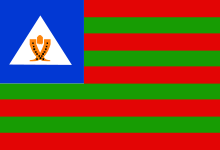This article needs additional citations for verification. (January 2015) |
 Bubi ethnic flag | |
 Bubi children | |
| Total population | |
|---|---|
| ~100,000 worldwide[citation needed] | |
| Regions with significant populations | |
| Languages | |
| Bube, Spanish, French, Portuguese | |
| Religion | |
| Predominantly: Christianity Minority: African traditional religion | |
| Related ethnic groups | |
| other Bantu peoples, Igbo people |
The Bubi people (also known as Bobe, Voove, Ewota and Bantu Bubi) are a Bantu ethnic group of Central Africa who are indigenous to Bioko Island, Equatorial Guinea. Once the majority group in the region, the population experienced a sharp decline due to war and disease during Portuguese expeditions. By the end of Spanish colonial rule in the mid 20th century, and after substantial intermarriage with newly introduced populations, such as Afro-Cubans, Krio people, Portuguese people and Spaniards, the Bubi people, again, experienced a great decline in number. Seventy-five percent perished due to tribal/clan rooted political genocide during a civil war that led to Spanish Guinea's independence from Spain.[citation needed] This, too, sparked mass exodus from their homeland with most of the exiles and refugees immigrating into Spain. The indigenous Bubi of Bioko Island have since co-existed with non-indigenous Krio Fernandinos; and members of the Fang ethnic group, who have immigrated in large numbers from Río Muni. Once numbering approximately 3 million,[citation needed] the Bubi currently number around 100,000 worldwide.
The Bubi people, both living in Equatorial Guinea and exiled abroad, have long held little political power and economic stake in their native land. However, appointed government officials, such as the former Prime Minister Miguel Abia Biteo Boricó and several other members of the current Equatorial Guinea government, are of ethnic Bubi descent.
Most Bubi people that remain on Bioko Island, as well as those native to Gabon, speak the Bube language. Many of the islanders also speak Spanish, French and Portuguese as a secondary language.[citation needed]